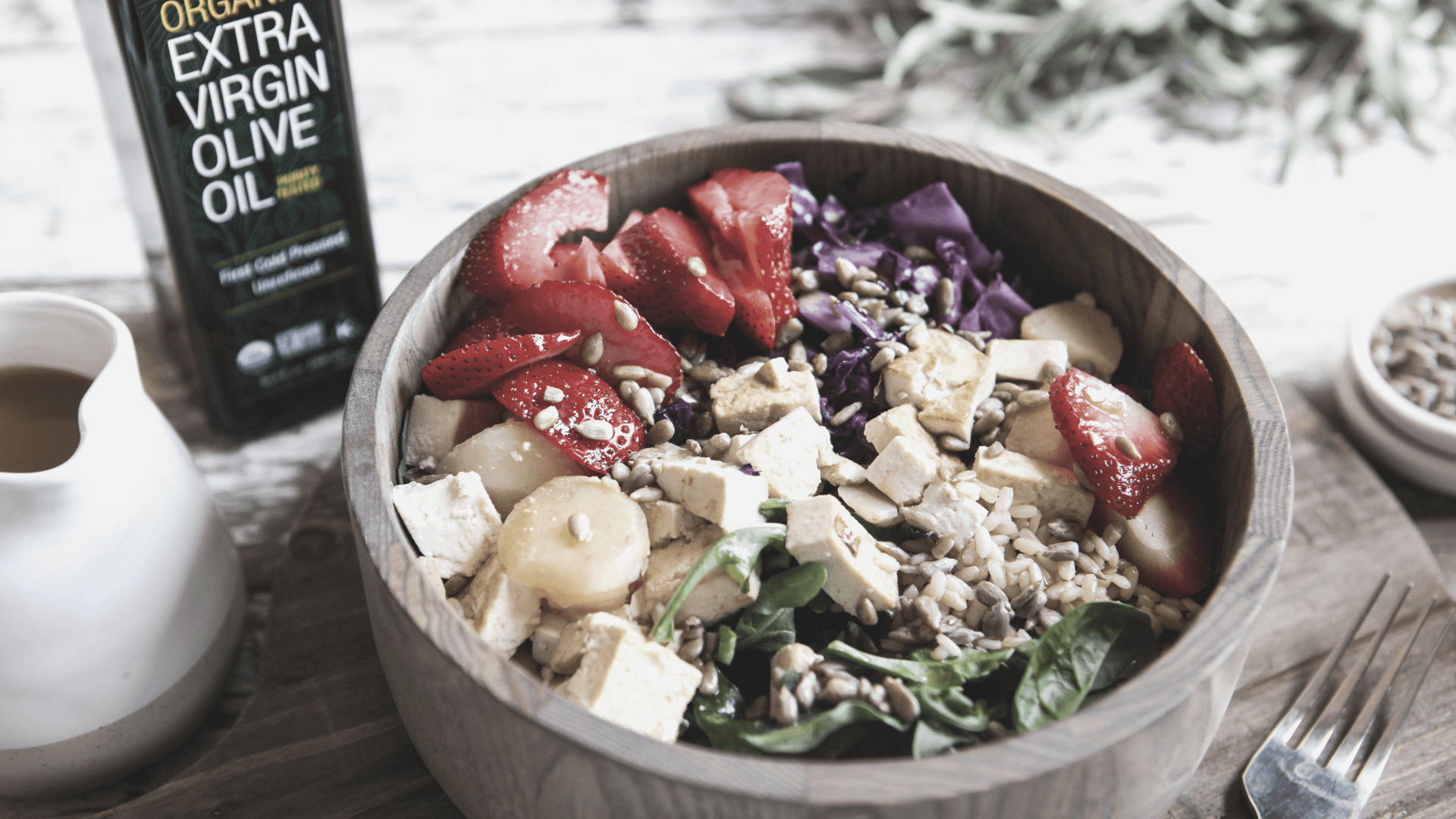Ready to get the hands dirty today with your guide to emulsifiers in food?
You’ve been asking me about emulsifiers in food for a long time now.
Thing is, though, there are so many.
But I want to help you navigate.
So let’s just start here.
Your Guide to Emulsifiers in Food
Click HERE to save this post for later.
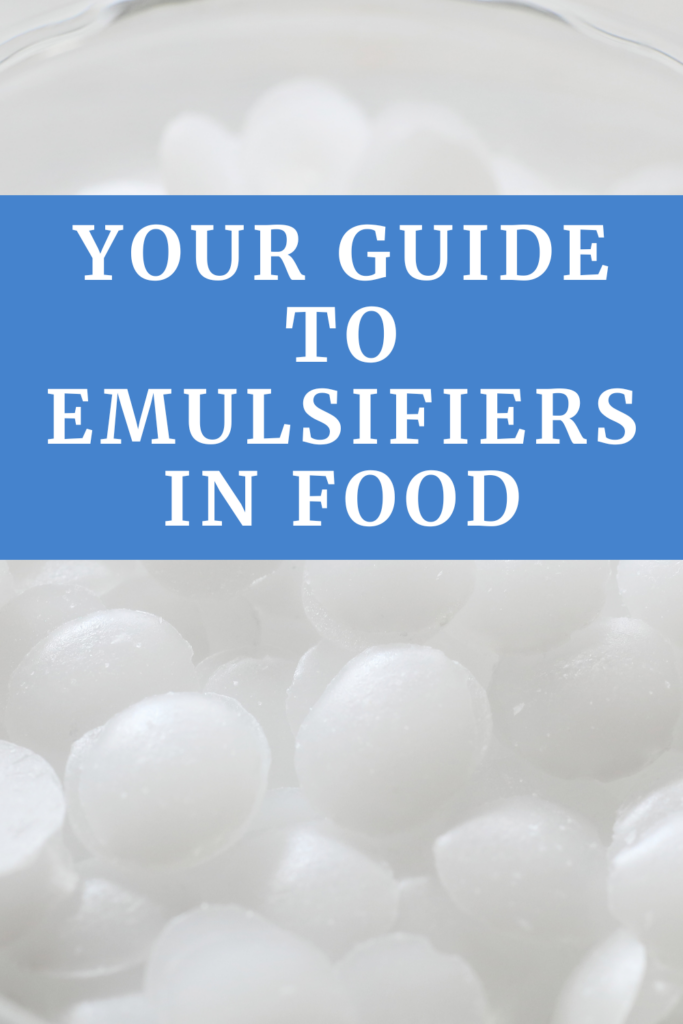
What is a Food Emulsifier?
Let’s start with the basics so you understand what an emulsifier is and how it’s relevant for food.
By definition an emulsifier is,
a substance that stabilizes an emulsion (a fine dispersion of minute droplets of one liquid in another in which it is not soluble or miscible), in particular a food additive used to stabilize processed foods.
In other words, emulsifiers help keep processed foods (or even foods you make by hand at home) stable and/or enhance the structure because oil and water don’t mesh together on their own.
Master List of Food Emulsifiers
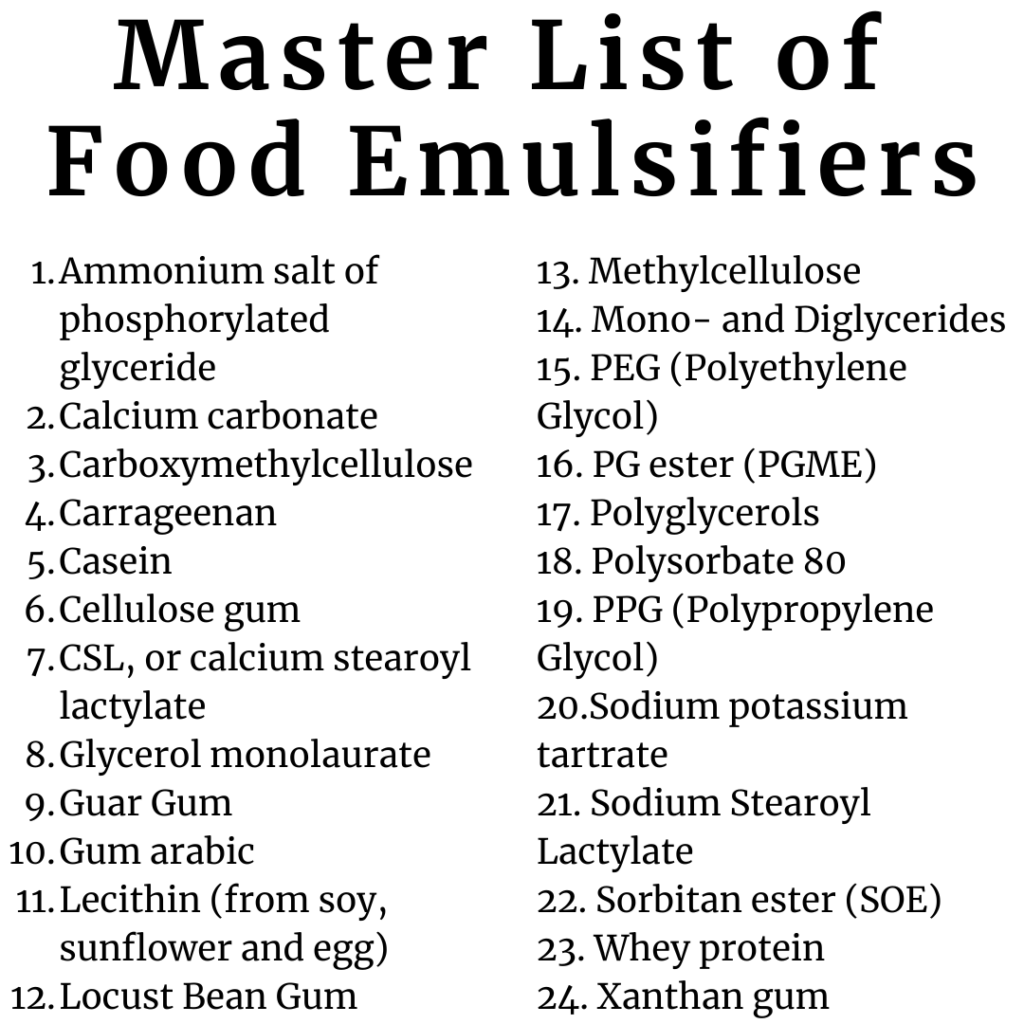
- Ammonium salt of phosphorylated glyceride
- Calcium carbonate
- Carboxymethylcellulose
- Carrageenan
- Casein
- Cellulose gum
- CSL, or calcium stearoyl lactylate
- Glycerol monolaurate
- Guar Gum
- Gum arabic
- Lecithin (from soy, sunflower and egg)
- Locust Bean Gum
- Methylcellulose
- Mono- and Diglycerides
- PEG (Polyethylene Glycol)
- PG ester (PGME)
- Polyglycerols
- Polysorbate 80
- PPG (Polypropylene Glycol)
- Sodium potassium tartrate
- Sodium Stearoyl Lactylate
- Sorbitan ester (SOE)
- Whey protein
- Xanthan gum
You’ll find even more common emulsifiers HERE.
If lists like this are interesting to you, then you’ll love my book, A Gutsy Girl’s Bible: a 21-day approach to healing the gut. In it, you’ll find 100+ Creations. Grab your copy on Amazon HERE.
Or, have this book at your fingertips instantly by downloading the PDF now.
Common Packaged Foods that Contain Emulsifiers
Because even many homemade foods need an emulsifier, they aren’t all inherently “bad.”
And if I’m being perfectly honest, even the packaged ones aren’t always bad.
Regardless, here is a list of common packaged foods that contain emulsifiers:
- peanut butter
- ice cream
- margarine and other low-fat spreads
- biscuits
- cakes
- frozen desserts in general
- bread
- chewing gum
- mayonnaise
- salad dressings
- processed meats
- chocolates
- candies, toffees
- fillings and icings
- coffee creamers
- infant formula
- topping powders
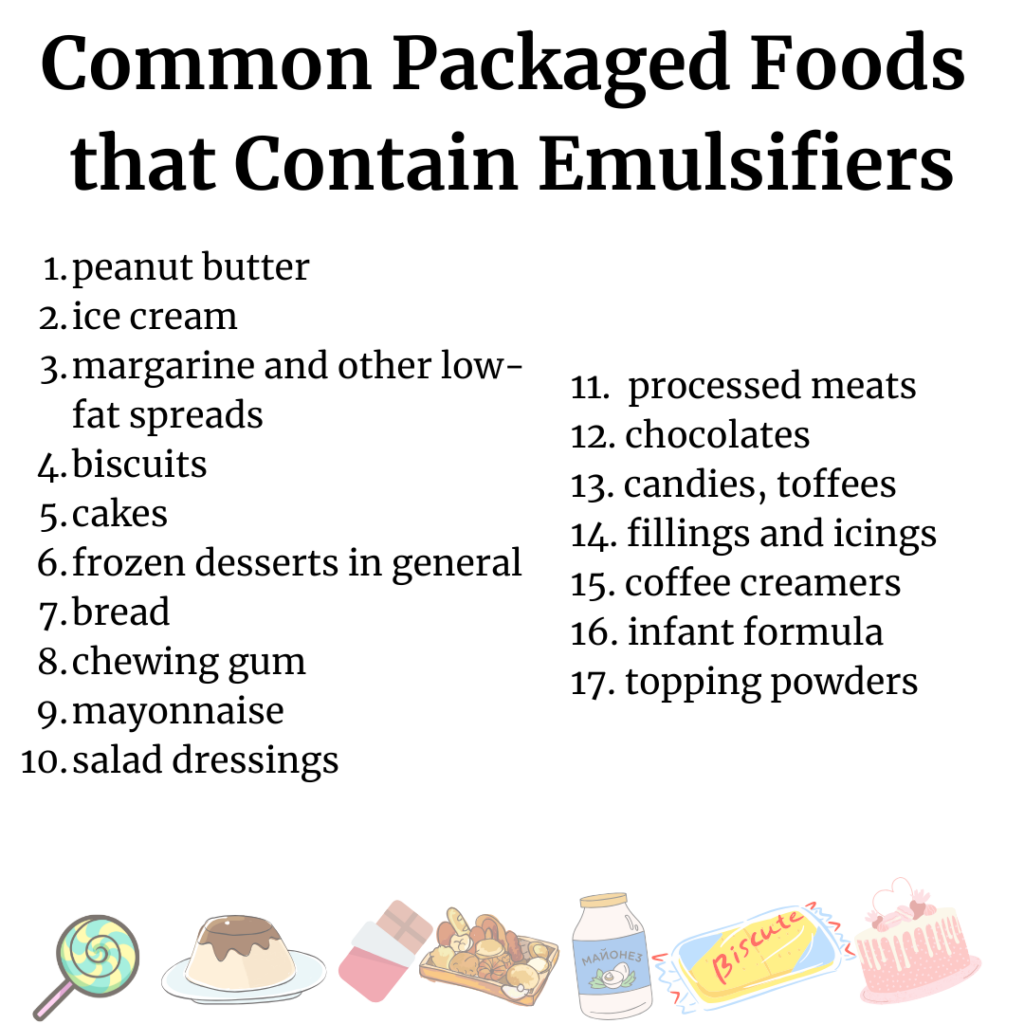
Emulsifiers and the Gut
Now that all of that is out of the way, I’m ready to address your real question/concern:
Are food emulsifiers bad for my gut and/or gut healing?
So let’s break it down.
The Concern with Emulsifiers
It’s true.
The research is there that (certain) emulsifiers have been shown to affect the gut.
And the research shows that they can contribute to both leaky gut and cause changes in the microbiome.
Leaky Gut
Emulsifiers can disrupt bacteria-mucus interactions and comprise the mucous layer, causing inflammation and contributing to leaky gut.
Emerging evidence suggests that permitted dietary emulsifiers may impact on gut health through impairing intestinal barrier function, thus increasing antigen exposure, and/or by modulating the microbiota, thus potentially increasing the incidence of inflammatory bowel disease (IBD) and metabolic syndrome.
Microbiome
As emulsifiers relate to the gut microbiome, some of the research states,
Potential effects of food additives on the gut microbiome have generally been overlooked; however, emerging evidence, mainly from animal studies, suggests that several common food additives, not just emulsifiers, can induce microbiota‐mediated adverse effects.
Taken together, the emerging effects on intestinal inflammation and gut microbiota are consistent with those observed in IBD. Food exclusion diets for Crohn’s disease, which encourage the avoidance of additive‐rich ‘processed foods’, have been observed to induce remission, although lots of other dietary factors may be involved.
And also,
When added to a dynamic in vitro slurry that mimicked a human colonic microbial culture, both polysorbate 80 and carboxymethylcellulose induced gene expression profile changes in the bacterial slurry, including an increase in bacterial flagellin expression.
However, to date these effects have not been confirmed in humans.
Should You be Concerned with Food Emulsifiers?
Ready to feel annoyed?
The answer, once again is, “It depends.”
That’s right.
It depends on your current state of health, what your body will and will not tolerate, and finally the main health challenges you currently deal with.
First, it’s very important to make note that I stated “certain” emulsifiers have been shown to affect the gut.
Carboxymethylcellulose
For example, let’s say you have SIBO.
Well, the research says that in mice, the emulsifier Carboxymethylcellulose had an effect on the microbiota via bacterial overgrowth.
And the tricky part is that you aren’t likely to see that long word on food packaging.
Instead, you’d see “cellulose gum” or even simply “dietary fiber” on the label.
Other emulsifiers that come with more caution for intestinal damage include:
- Polysorbate 80
- Glycerol monolaurate
- Methylcellulose
On the other side, emulsifiers are not all created equally.
Lecithins
You see these terms commonly used in “natural products:”
- lecithin
- sunflower lecithin
- soy lecithin
- egg lecithin
Ingestion of lecithin at high dosage in healthy human volunteers (22‐83 g/day for 2‐4 months) has shown no obvious ill effects, though a lowering of plasma triglyceride levels has been reported.
My Personal Opinion and Take on Food Emulsifiers and the Gut
Like everything else, the research is there on both sides of the fence: food emulsifiers are fine for the gut and food emulsifiers are highly damaging for the gut.
So here’s where I’m at with them.
Feel free to use these guidelines for your own journey as well:
- Type matters
Egg lecithin and Polysorbate 80 are not the same emulsifier quality. And some emulsifiers could even be argued as dangerous ((PEG (Polyethylene Glycol) for example)).
- Gut health vs Gut Healing
When I was healing my gut, I avoided the entire master list of emulsifiers almost exclusively. But it wasn’t only because of the emulsifier (i.e. Guar Gum) itself. It was because if a product contained Guar Gum, it usually contained many other emulsifiers and additives as well. During deep periods of gut healing, I don’t think consuming them is optimal. It goes back to my post on Ingredient s vs Ingredients.
- Your condition
But also, maybe your specific gut condition is not okay with emulsifiers. Chris Kresser has written about xanthan gum and carrageenans as they relate to IBS and/or IBD. But keep in mind that it’s not always about the emulsifier itself, instead about the structural properties which can produce unpleasant gut symptoms
- Consumption frequency
Let’s say you are feeling great and entering into more of the gut health phase. Or, maybe you’re reading this post because your gut is already healthy and you are just looking to optimize it (which we should all be doing, every single day!) In this case, frequency matters. Recently I had some Nubocha ice cream, which is sort of the inspiration to finally write this post today. Nubocha is a dairy-free gelato with (all things considered) minimal ingredients. We love it, and when I posted it on my Instagram stories I got asked about the locust bean gum and xanthan gum in the Peanut Butter variety. It’s a treat. Everything I eat these days isn’t filled with gums, thickening agents, emulsifiers, additives, etc. However, now that I’m healed, I have zero problems with a treat here and there. Frequency matters.
- Avoid when possible
If I’m given the option between two products; one with an emulsifier and one without, I’m always choosing the one without. And this is not to say that the particular emulsifier is good, bad, or anything in between. It’s simply just my personal preference to keep things as whole and minimal as possible. But don’t kid yourself, this is a lot more challenging than simply choosing product A or B. Let’s say you have Nubocha Peanut Butter or Straus Organic Mint Chocolate Chip to choose from. While the Strauss option doesn’t contain any gums, thickeners, stabilizers, artificial ingredients, or coloring agents in their ice cream, it is still dairy. You might be highly intolerant (or even allergic to) dairy. In that case, are the gums contained in Nubocha that big of a deal?
Take this all for what it’s worth to you at this stage of your journey.
It’s actually not super complicated to figure it out.
Start here and do these two things:
- Ask, “How is this working for me?“
- Keep a tight food journal via a gut healing journal. It’s the only way to know what ingredients are bothering you, in what quantities, etc.
You can get the instant PDF version of the 90-day gut healing journey journal HERE or, purchase the physical, spiral-bound copy to ship directly to your doorsteps.
Questions about any of the emulsifiers in particular?
Is there one from the master list above that you’d enjoy a full post on?
Let me know in the comments below.
Sources: HERE, HERE, HERE and HERE.
If you liked this post, you might also enjoy:
Xox,
SKH
🤰 bloating be gone! weight loss through optimal gut health for women
💃ʜᴇᴀʟ ʏᴏᴜʀ ɢᴜᴛ. ʜᴇᴀʟ ʏᴏᴜʀ ʟɪfe.
🫶🏻 founder gutbyome.com

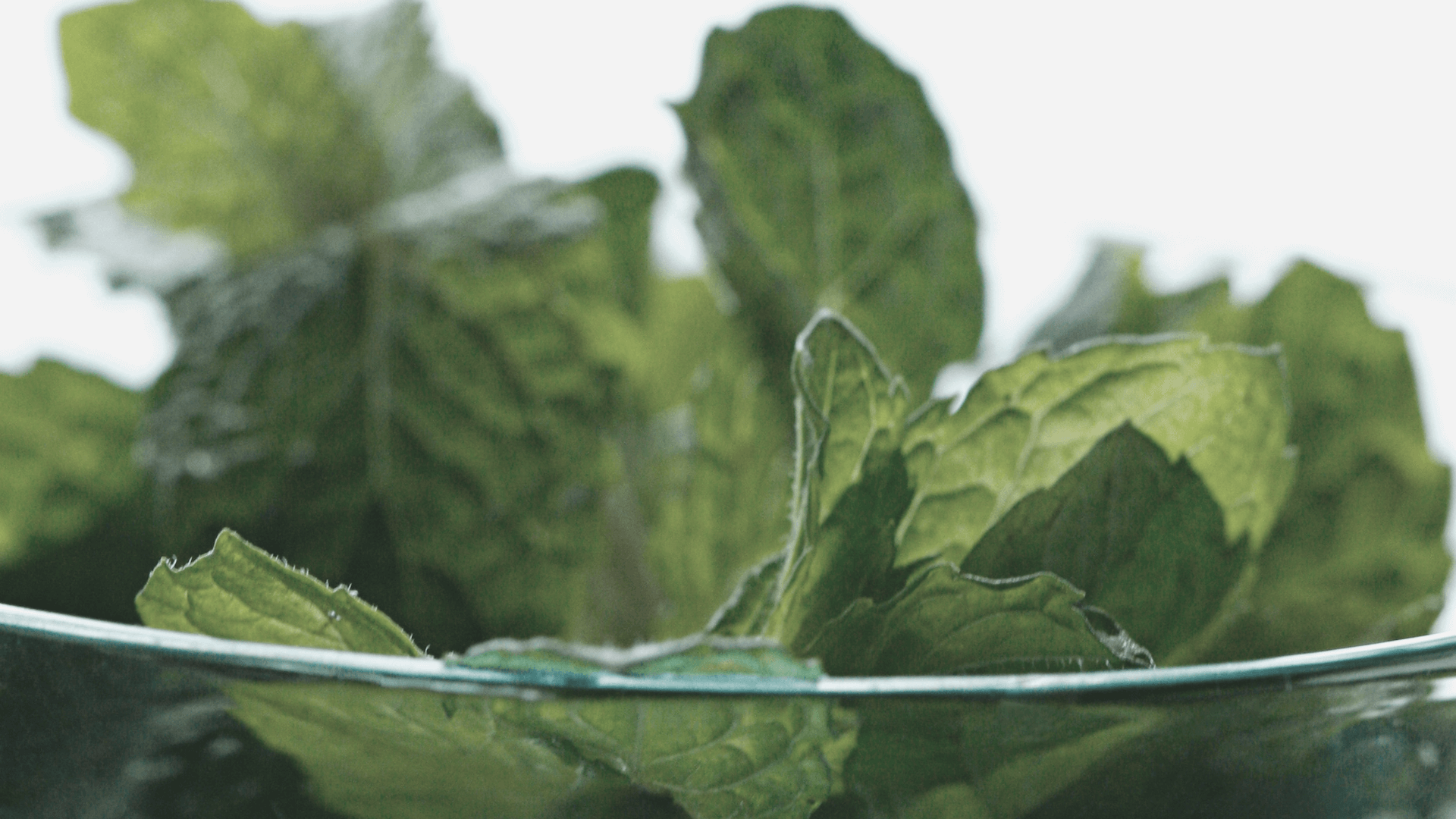
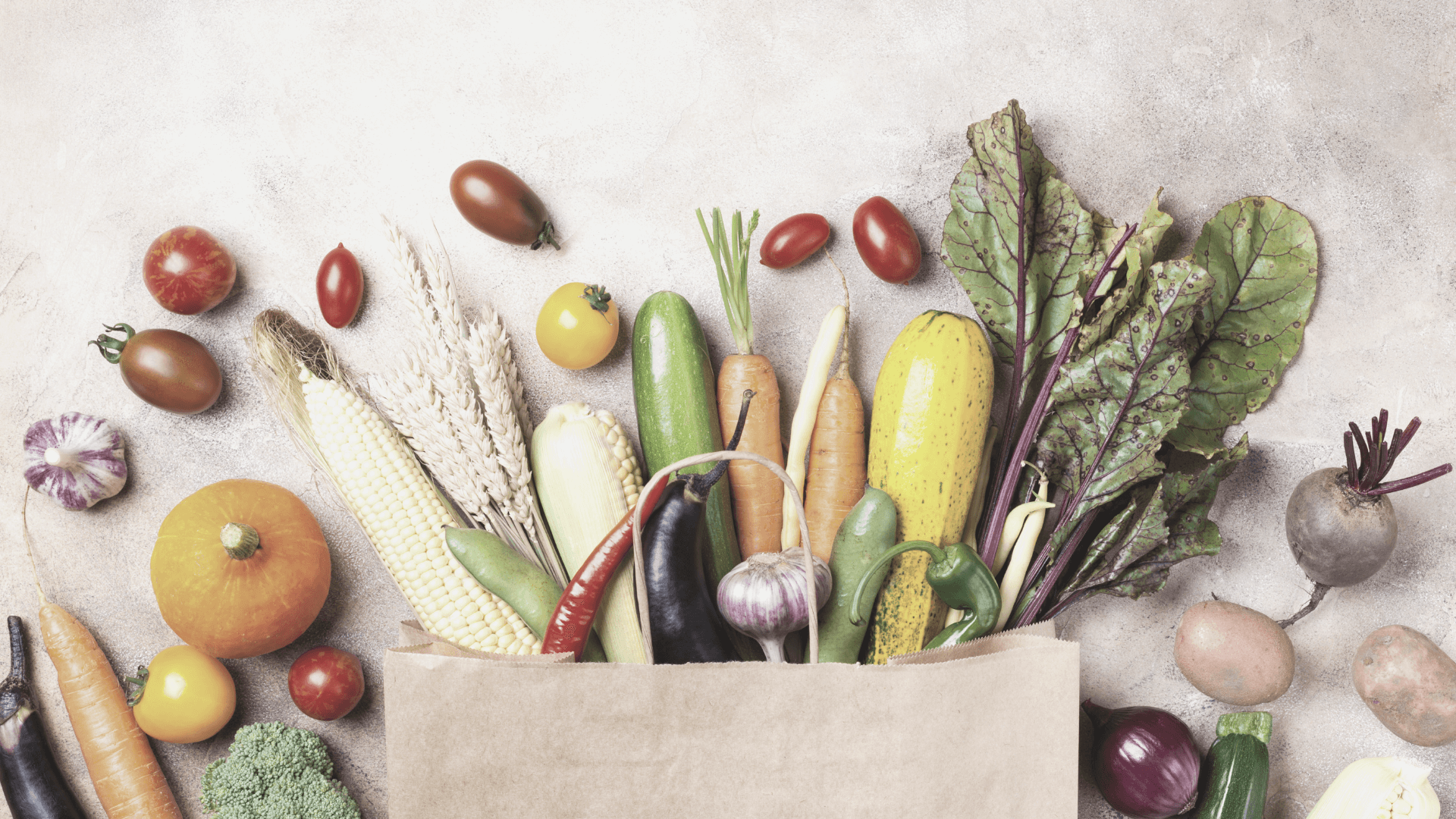


![Grief Share [Q&A 2 with A Gutsy Girl]](https://agutsygirl.com/wp-content/uploads/2021/08/episode-16-podcast-featured-agutsygirl.com_.png)
